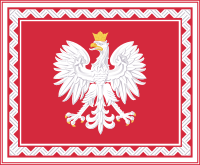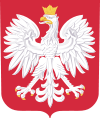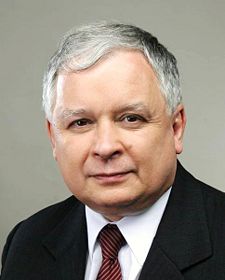President of the Republic of Poland
| President of the Republic of Poland |
|
 Presidential Jack |
|
| Term length | Five years, renewable once |
|---|---|
| Inaugural holder | Gabriel Narutowicz |
| Formation | December 11, 1922 |
| Website | www.prezydent.pl |
| Republic of Poland |
 This article is part of the series: |
|
|
|
Judiciary
Elections
Divisions
Political parties
Foreign policy
See also
|
|
Other countries · Atlas |
The President of the Republic of Poland (Polish: Prezydent Rzeczypospolitej Polskiej, shorter form: Prezydent RP) is the Polish Head of State. His or her rights and obligations are determined in the Constitution of Poland.
The President of the Republic of Poland is the head of state, the supreme representative of Poland on the international area. He has the executive authority. He has a right to dissolve the parliament in certain cases (i.e. when it fails to form a Council of Ministers or to adopt the budget).
Although in the English language the Polish head of state is commonly referred to as President of Poland, in Poland the President is always referred to as the President of the Republic of Poland (Prezydent Rzeczypospolitej Polskiej or Prezydent RP) or less commonly as the President of the Republic (Prezydent Rzeczypospolitej), but never as the President of Poland (Prezydent Polski).
Contents |
Election
The President of Poland is elected directly by the people to serve for 5 years and can be reelected only once. Pursuant to the provisions of the Constitution, the President is elected by the majority of more than 50% of valid votes. If no candidate succeeds in passing this threshold, the second round of the elections is held with the participation of two candidates who won the largest number of votes.
In order to be registered as a candidate in the presidential election, one must be a Polish citizen, be at least 35 years old on the day of the first round of the election and collect at least 100,000 signatures of voters.
Powers

The President has a free choice in selecting the Prime Minister, yet in practice he usually gives the task of forming a new government to a politician supported by the political party with the majority of seats in the Sejm (usually, though not always, it is the leader of that political party).
The President has the right to initiate the legislative process. He also has the opportunity to directly influence it by using his veto to stop a bill; however, his veto can be overruled by a three-fifths majority vote in the presence of at least half of the statutory number of members of the Sejm (230). Before signing a bill into law, the President can also ask the Constitutional Tribunal to verify its compliance with the Constitution, which in practice bears a decisive influence on the legislative process.
In his role as supreme representative of the Polish state, the President ratifies and revokes international agreements, nominates and recalls ambassadors, and accepts the accreditations of representatives of other states. The President also makes decisions on the award of state distinctions and orders. In addition, he has the right of clemency, viz. he can dismiss final court verdicts (in practice, the President consults such decisions with the Minister of Justice).

The President is also the Supreme Commander of the Armed Forces; he appoints the Chief of General Staff and the commanders of all the armed forces; in wartime he nominates the Commander-in-Chief of the Armed Forces and can order the general mobilization. The President performs his duties with the help of the following offices: the Chancellery of the President, the Office of National Security, and the Body of Advisors to the President.
Presidential residencies and properties
Several properties are owned by the Office of the President and are used by the Head of State as his or her official residence, private residence, residence for visiting foreign officials etc.
- The Presidential Palace in Warsaw, largest palace in Warsaw, the official seat of the President of the Republic of Poland since 1993, the first presidential tenant was Lech Wałęsa when he moved to the Palace from Belweder in 1994.
- Belweder in Warsaw, was the official seat of the President until 1993, currently owned by the Office of the President as the official residence of the President and is used by the President and the Government for ceremonial purposes. The palace also serves as an official residence for heads of state on official visits to Poland and other important guests.
- Presidential Castle in Wisła, a château built for the Habsburgs as their hunting cottage, rebuilt 1929-1931 and used as recreational residence by the President Ignacy Mościcki. Since 2002 again a property of the President, restored and opened in 2005 by the President Aleksander Kwaśniewski. It is today a recreational and conference centre for the President and a hotel.
- Residence of the President of the Republic of Poland in Łucień
- Manor House of the President of the Republic of Poland in Ciechocinek
Acting President of Poland
Former Presidents
Since former Presidents of Poland are for the most part well-known, public figures (quite often of celebrity status) each of them is entitled to lifetime personal protection (though only within state limits) by Biuro Ochrony Rządu officers, in addition to receiving a substantial pension and being given a private office.
As of 2007 four former Presidents of Poland are alive:
- Wojciech Jaruzelski (served 1989-1990, before 1989 he was Chairman of the State Council, also titular head of state, and President of the People's Republic of Poland until December 1989)
- Ryszard Kaczorowski (served 1989-1990), the last President in Exile
- Lech Wałęsa (served 1990-1995) - first President elected by direct popular vote
- Aleksander Kwaśniewski (served 1995-2005) - first President to serve two terms
Additional information
Age upon entering office
- Lech Kaczyński - 56 years old
- Aleksander Kwaśniewski - 41 years old (youngest president)
- Lech Wałęsa - 47 years old
- Wojciech Jaruzelski - 66 years old
- Ryszard Kaczorowski - 70 years old
- Kazimierz Sabbat - 73 years old
- Edward Raczyński - 87 years old (oldest at time of entering and leaving)
- Stanisław Ostrowski - 79 years old
- August Zaleski - 63 years old
- Władysław Raczkiewicz - 54 years old
- Bolesław Bierut - 54 years old
- Ignacy Mościcki - 58 years old
- Stanisław Wojciechowski - 53 years old
- Gabriel Narutowicz - 57 years old
Other information
- Four Presidents who died in office
- Gabriel Narutowicz (assassinated)
- Władysław Raczkiewicz (natural causes)
- August Zaleski (natural causes)
- Kazimierz Sabbat (natural causes)
- Four Presidents who resigned from office
- Stanisław Ostrowski
- Ignacy Mościcki (escaped into exile after Germany occupied Poland in September 1939)
- Wojciech Jaruzelski (agreed to shorten his term)
- Ryszard Kaczorowski (resigned after election of Lech Wałęsa, effectively abolishing the Polish government in exile in favour of the new President)
- Three Presidents who were elected by direct vote
- Lech Wałęsa (elected in 1990, not reelected in 1995)
- Aleksander Kwaśniewski (elected in 1995 and reelected in 2000)
- Lech Kaczyński (elected in 2005, incumbent)
- Presidents who were elected by Parliament
- Gabriel Narutowicz
- Stanisław Wojciechowski
- Ignacy Mościcki
- Bolesław Bierut
- Wojciech Jaruzelski
- Presidents who were not formally elected (by Parliament or direct vote), but were appointed (all in the Polish government in exile)
- Władysław Raczkiewicz
- August Zaleski
- Stanisław Ostrowski
- Edward Raczyński
- Kazimierz Sabbat
- Ryszard Kaczorowski
See also
- Polish presidential elections of 1990, 1995, 2000, 2005
- Prime Minister of the Republic of Poland
- List of Polish presidents
- List of Polish monarchs
- Lists of incumbents
- Naczelnik państwa
Fictional presidents
- President Julian Szczęsny (played by Andrzej Seweryn) - President in Polish political drama TV series Ekipa. By the end of season one he died after injuries result by shot down his helicopter over Kabul during a visit
- Acting President Jan Matajewicz (played by Marek Frąckowiak) - also in Ekipa, a leader of major right-wing party and close ally to Szczęsny briefly assumed, as Sejm Marshal, presidential duties after his death. He resigned after became a suspect in criminal case
- President Bartosz Czop (played by Andrzej Grabowski) - populist President in 19th meridian (19. południk). Said to be modeled on Andrzej Lepper
- Outgoing President Kazimierz Czechmeszyński (played by Jan Machulski) - also in 19th meridian
External links
|
||||||||
|
||||||||
|
|||||
